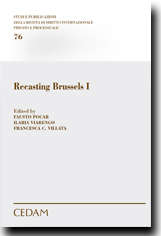The Role of Foreign Enforcement Proceedings in Forum Non Conveniens
The doctrine of forum non conveniens, in looking to identify the most appropriate forum for the litigation, considers many factors. Two of these are (i) a desire to avoid, if possible, a multiplicity of proceedings and (ii) any potential difficulties in enforcing the decision that results from the litigation. However, it is important to keep these factors analytically separate.
In the Supreme Court of Canada’s recent decision in Haaretz.com v Goldhar (available here) Justice Abella noted that “enforcement concerns would favour a trial in Israel, in large part because Haaretz’s lack of assets in Ontario would mean that any order made against it would have to be enforced by Israeli courts, thereby raising concerns about a multiplicity of proceedings” (para 142). Similarly, Justice Cote concluded (paras 82-83) that the fact that an Ontario order would have to be enforced in Israel was a factor that “slightly” favoured trial in Israel.
Justice Abella has arguably conflated the two factors rather than keeping them separate. The concerns raised by a multiplicity of proceedings tend to focus on substantive proceedings rather than on subsequent procedural steps to enforce a judgment. Courts rightly try to avoid substantive proceedings in more than one jurisdiction that arise from the same factual matrix, with one of the core concerns being the potential for inconsistent findings of fact. Of course, enforcement proceedings do involve an additional step that is avoided if the judgment can simply be enforced locally. But that, in itself, should not be grouped with the kinds of concerns raised by multiple substantive proceedings. It will be unfortunate if subsequent courts routinely consider contemplated foreign enforcement proceedings as raising a multiplicity of proceedings concern.
Justice Cote (with whom Justices Brown and Rowe agreed) did not conflate enforcement proceedings and the concern about multiplicity. However, it should be noted that Club Resorts, which she referenced on this point, stated (para 110 that “problems related to the recognition and enforcement of judgments” is a relevant factor for forum non conveniens. The stress there should be on “problems”. If it can be anticipated that there may be problems enforcing the judgment where the assets are, that is an important consideration. But if no such problems are anticipated, the mere fact that enforcement elsewhere is contemplated should not point even “slightly” against the forum as the place for the litigation. In Haaretz.com the judges who consider the enforcement factor did not identify any reason to believe that enforcement proceedings in Israel would be other than routine.
The dissenting judges (Chief Justice McLachlin and Justices Moldaver and Gascon) properly separated these two factors in their analysis (paras 234-237). They did not treat enforcement proceedings as part of the analysis of a multiplicity of proceedings. On enforcement, their view was that in defamation proceedings it is often sufficient just to obtain the judgment, in vindication of the plaintiff’s reputation, and that enforcement can thus be unnecessary or “irrelevant” (para 236). Justice Cote strongly disagreed (para 83). Leaving that dispute to one side, the dissent could have also made the point that this was not a case where any “problems” had been raised about enforcement in Israel.

